If you’ve been wondering whether your chickens can eat celery, you’re not alone. As omnivores, these feathery friends are true whatever-vores, devouring anything from blackberries and grapes to the occasional mice or even snakes in the backyard.
But when it comes to feeding them celery, a bit of preparation is key. The stalk, whether raw or cooked, needs to be chopped into small pieces to avoid issues like crop impaction from the strings.
This is especially important because their natural instinct often leads them to avoid dangerous foods, but celery’s essential nutrients, like vitamin A, calcium, and vitamin K, make it a worthwhile occasional treat.
In my own chicken-keeping experience, offering softened celery in the coop during the afternoon is a great way to keep the birds happy and occupied. While it’s mostly water with low nutrition, celery can be a healthy addition to their diet in moderate amounts.
I’ve watched my flock eagerly rush to the gate, ready to enjoy these natural treats. Pairing it with high-protein pellets ensures they don’t fill up on low-value snacks, and seeing their joy reminds me why I love caring for them. Whether it’s celery root or the leaves, serve with care and watch your soft-hearted “softies” relish their new snack!
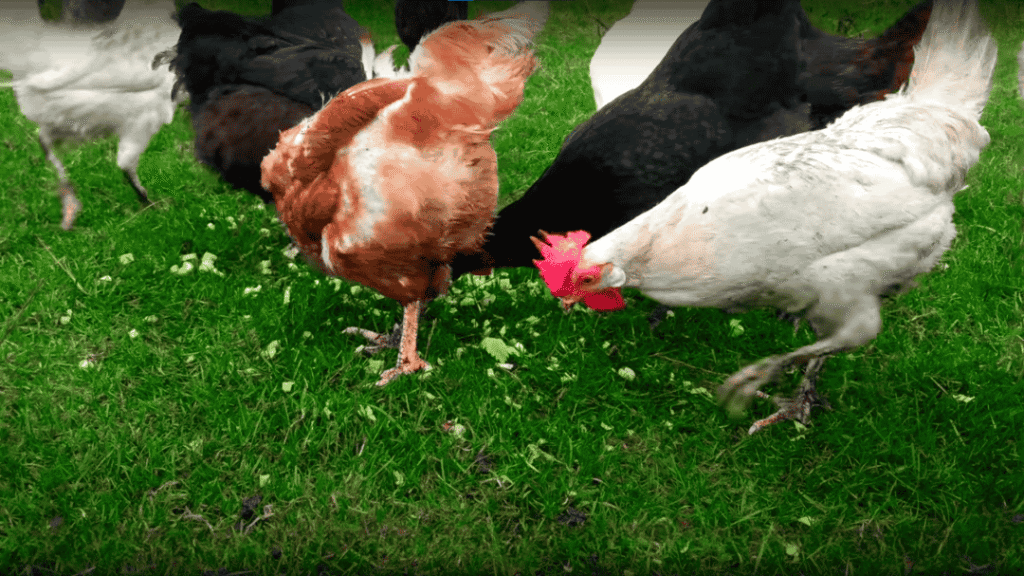
Table of Contents
ToggleCan Chickens Eat Celery?
Yes, chickens can enjoy celery as a nutritious treat, but there are important considerations to keep in mind. Since celery stalks are stringy, firm, and sometimes hard to consume, chopping them into small pieces makes it easier for your flock to eat safely.
While it’s a great way to add fresh food to their diet, too much can disrupt the carefully formulated balance of their nutrition, particularly the macro and micro nutrients they need. Fiber-filled vegetables like celery have little fat or protein, so feeding them in moderation ensures your chickens stay safe and enjoy the nutritional value without negative effects. Even if the celery has gone a bit limp, it can still add some variety to their diet, but avoid mixing in anything toxic.
Can Chickens Eat Celery Raw?
Yes, chickens can eat celery raw, but it’s important to prepare it properly to avoid any risk. Since celery is stringy and can lead to crop impaction if consumed in long strings, it’s best to serve it chopped into bite-size pieces.
If you toss out an entire stalk, your chickens might peck at it, but struggle to bite it since they don’t have teeth. To make it easier for your flock to manage, you can also serve cooked celery.
Whether raw or cooked, preparing it beforehand ensures they can safely enjoy this treat without issues. Just like fodder, which shouldn’t be grown for too long, proper preparation is key for your chickens’ safety.
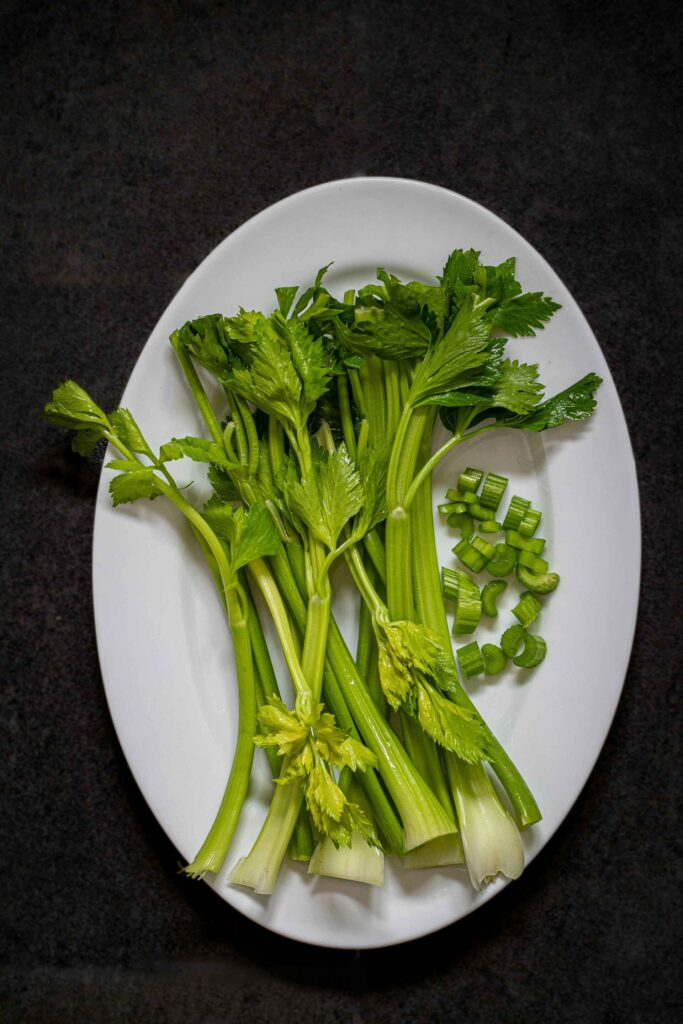
Can Chickens Eat Celery Leaves?
Yes, chickens can eat celery leaves, and many actually prefer them over the stalks. The top set of leaves, which you might typically throw away, can be a delightful treat for your flock. In my experience, offering the leaves makes them go absolutely crazy with excitement. So next time you have extra celery, don’t hesitate to offer the leaves to your chickens—they’ll love it!
How much Celery can Chickens Eat?
While celery is rich in fiber and nutrients, it’s important not to overdo it. For a flock of 8-10 chickens, I recommend offering 1 cup of chopped celery as an occasional supplement.
Though celery is low in sugar compared to other treats like bananas or grapes, it’s also low in protein (just 0.8g per cup). A protein-deficient diet can lead to a reduction in egg laying, reduced hatchability of eggs, and poor overall health.
Always pair celery with a high-quality, balanced feed to ensure your chickens get the nutrients they need to maintain a healthy diet. Including greens like celery is fine in moderation, but their primary food source should always be carefully managed.
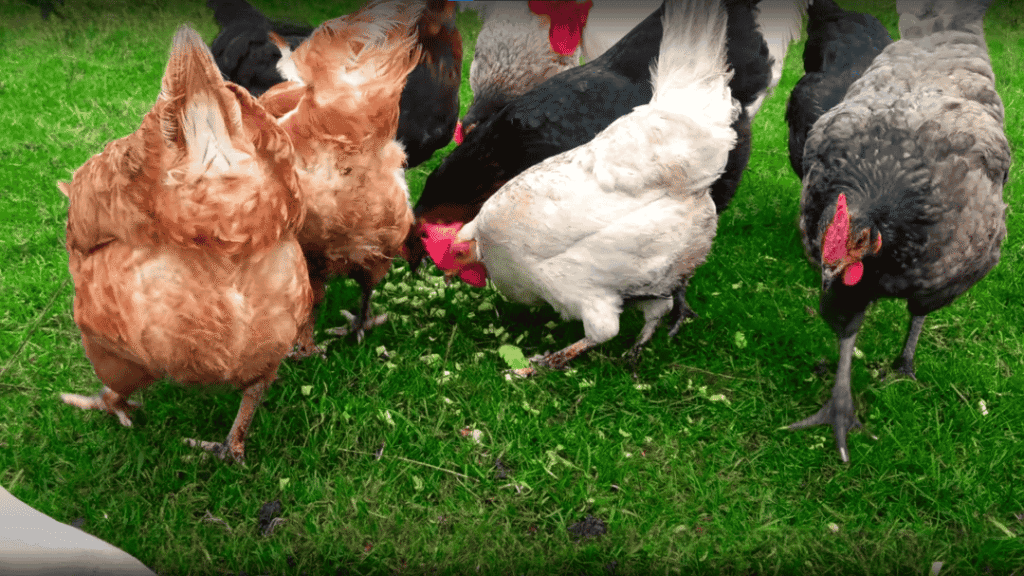
What is the Best Way to Feed Celery to Chickens?
The best way to feed celery to your flock is by chopping it into bite-size pieces, ideally 1/4″ or smaller. Since chickens lack teeth and opposable thumbs, offering large stalks can lead to frustration or even choking.
Use a knife, slap chop, or a food processor to make the pieces manageable. Always rinse and inspect the celery, removing moldy or rotten spots, and discard them in the compost pile. If there are bugs, remove them before feeding.
Spread treats like celery, blackberries, or apples in the yard rather than their dusty run to avoid contamination with chicken poo. Ensure the celery is free of fibrous strings that can cause an impacted crop, leading to digestive issues. Providing grit helps your chickens break down food in the gizzard and aids digestion, making the treat both safe and enjoyable.
Do Chickens Even Like to Eat Celery?
Chickens will definitely eat celery, but it’s not usually their absolute favorite. If you’re spreading celery in the yard alongside other tasty greens like clover or letting them find bugs to peck at, they might not seem too excited.
However, in the dead of winter, when fresh treats are scarce, celery can become the best thing for your flock. Of course, every flock is different—some may love celery, while others won’t touch it. You’ll only know if your chickens enjoy it when you give it a try!
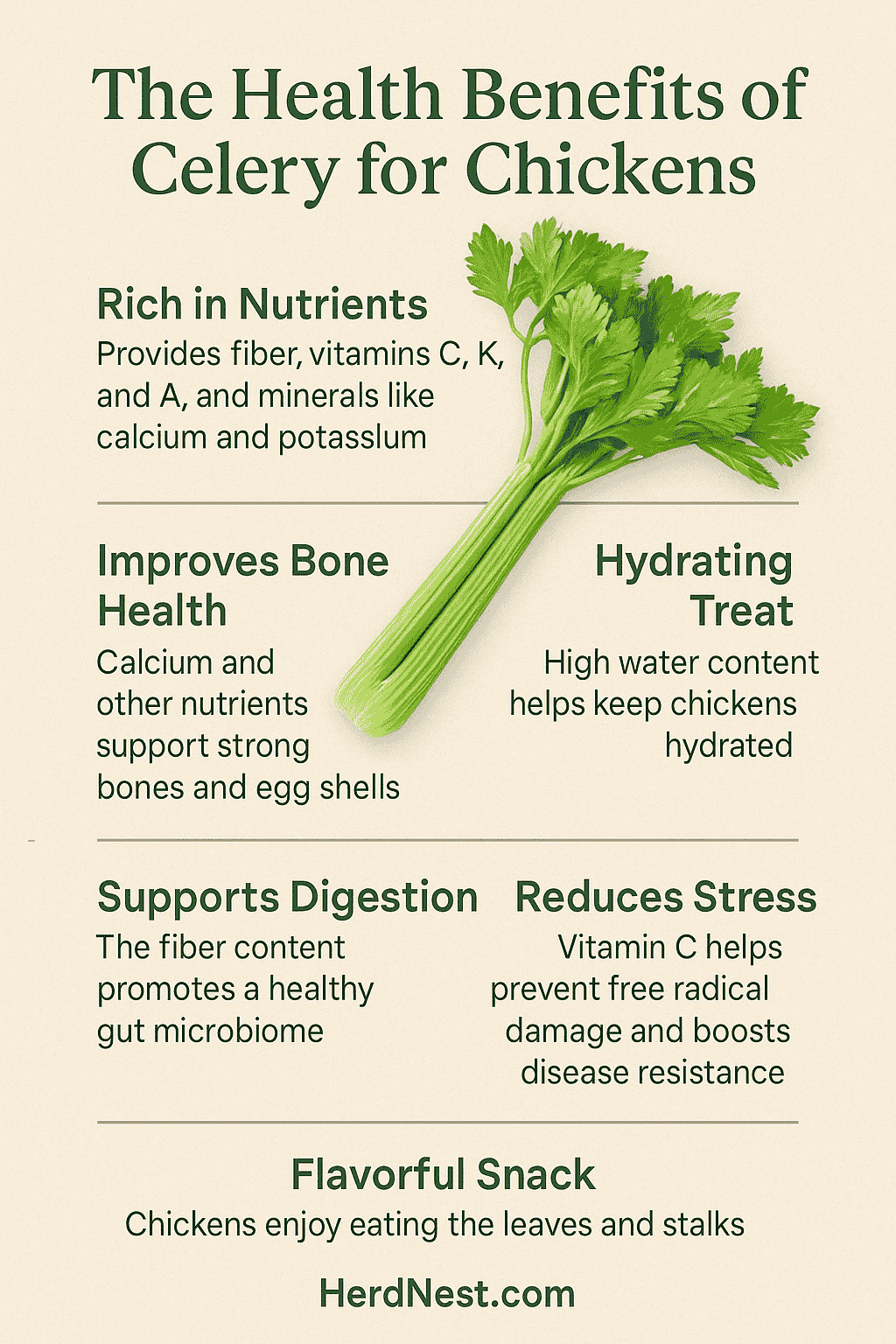
The Health Benefits of Celery for Chickens
Celery is more than just a simple snack for your chickens—it’s a nutritious addition to their balanced diet. Packed with fiber, vitamins like vitamin C, vitamin K, and vitamin A, and minerals such as calcium and potassium, celery helps improve bone health, supports strong egg shells, and boosts their laying rate.
The water-heavy nature of celery also makes it a hydrating treat, especially on summer days when your birds need extra moisture. Beyond hydration, the gut health of chickens can benefit from celery’s fiber, which nourishes their microbiome of over 900 strains of microorganisms, aiding digestion and even reducing ammonia emissions from undigested protein.
What makes celery even better is how much chickens love its outermost leaves and stalks. While harvesting celery from my garden, I’ve noticed my flock eagerly waiting to enjoy the celery leaves, which provide a natural flavor boost.
The free radical damage prevention from vitamin C also improves their stress response and disease resistance, helping maintain their overall health. Pair celery with other tasty veggies, apples, or grapes as part of a rotation to enhance their health potential and keep them happy and healthy all year round.
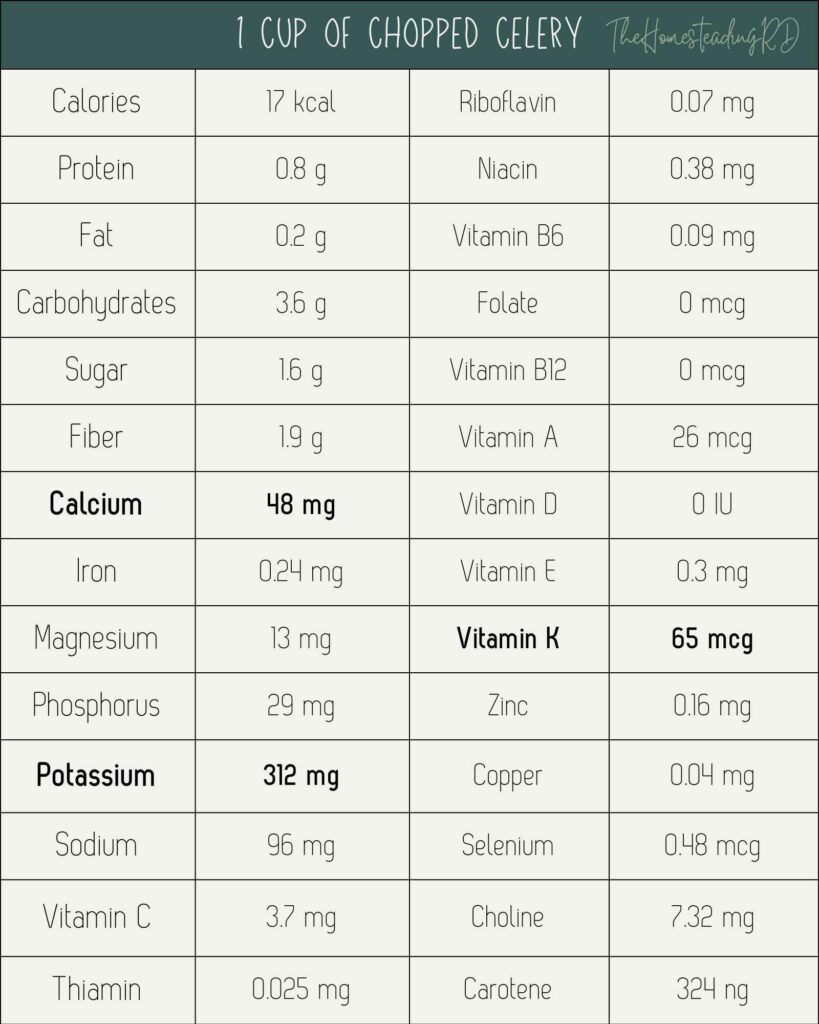
Final Thoughts
Feeding celery to your flock can be a fun and healthy treat, offering a great nutrient boost in their diet. Just make sure it’s properly prepared—dice it into smaller pieces and ensure it’s in good condition so your birds can easily pick up and eat it without any risk of injury or digestive upset.
Serving celery in moderation alongside other fresh fruits and veggies keeps your flock happy and healthy. Don’t forget to offer grit when introducing these treats, as it helps them digest their food safely. Your chickens will love the addition to their meals!




